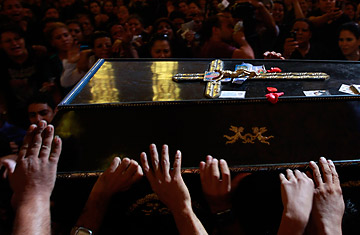
Egyptian Coptic Christians carry coffins during a mass funeral for victims of clashes with soldiers and riot police at a cathedral in the Abbassia neighborhood of Cairo on Oct. 10, 2011
When Andro Naguib Gobrail arrived at Cairo's main thoroughfare, the Corniche, on Sunday, he was on a mission: to pick up his father, Coptic human-rights activist Naguib Gobrail. The elder Gobrail had been shot in the leg when Egyptian soldiers attacked peaceful Christian protesters near the iconic Maspero building, which houses radio and television facilities. "They put a gun over my head, and they asked me to go away," the younger man tells TIME. "I carried my dad to my car. When I got there, I found a lot of people saying, 'We will kill you.' "
The Gobrails quickly left the area — but not before witnessing part of the rampage that by late Monday had left at least 24 dead and 270 injured, according to the Egyptian Health Ministry. Many were mowed down by vehicles driven by soldiers under the command of the Supreme Council of the Armed Forces (SCAF), the interim body ruling Egypt. According to Andro Naguib Gobrail, the cars deliberately plowed through crowds of protesters. "The army was driving over the bodies," Gobrail says. "It was disturbing." He says he later went to the nearby Coptic hospital on Ramses Street — which became a gathering place for survivors and members of the Christian community — and saw one corpse with 10 bullet wounds to the chest.
The Coptic community, which accounts for about 10% of Egypt's 80 million population, has long been one of its most embattled and vulnerable minority groups. On Sunday, the estimated 10,000 Christians who marched to Maspero — a landmark of the ousted Hosni Mubarak regime — were protesting the recent burning of a church in Aswan province by an ultraconservative Muslim group and what they perceive as the ruling military junta's soft response to anti-Christian attacks since Mubarak's ouster in February.
"Children, grandparents — nobody had weapons on them," says Lobna Darwish, an activist who marched on Sunday. Reaching Maspero that afternoon, the protesters encountered security forces who were "running toward us, firing at us, first into the air and then at people." Later, she says, able-bodied protesters returned to the Corniche to try and help the wounded. Darwish says they found gun-wielding soldiers "walking around in a zigzag, looking for people to hit. One man was in a burning car — he was pulled out. We saw people being run over on the Corniche. The soldiers were pointing at us, looking for people to hit. At one point, some people were hiding behind a car, and they came and looked for them too."
On Monday morning, bodies lined the floor of the morgue at the hospital, covered in blood. "People were bringing ice blocks and putting them over the bodies to prevent decay," says Lillian Wagdy, 30, who joined the protesters on Sunday. "It was an awful sight." Staffers, she says, soon ran out of ice.
The violence signals increasing tension between the ruling SCAF and a population frustrated by the military's increasingly strong-armed rule. "Time and again since February, the Egyptian military has used excessive force in responding to protests," Joe Stork, deputy Middle East director at Human Rights Watch, said in a statement. "The high death toll from the clashes on Oct. 9 shows the urgent need for thorough investigations that lead to accountability and better protection for the Coptic community."
Wagdy says civilian thugs came to join the army in attacking Christian protesters after buying into government hype. "They were saying it was a battle between Muslims and Christians," she says. "That's not really true. It was a battle between the army and civilians. Army vehicles were crushing protesters, and the army was saying [the protesters] had stolen them from army units" and were driving them into the crowd.
She says that after protesters dispersed and made their way to Tahrir Square, fighting broke out between Christians and neighborhood residents who had been led to believe that the Christians were armed. Police then teargassed the area. State-run TV "made an announcement for people to go support the army, and they were saying Christians were attacking the army," Gobrail says. "It's not true. The army was waiting for the protesters at Maspero, and then they attacked them using the cars and the guns."
On Monday, SCAF said it had asked the Egyptian government to form a committee to investigate Sunday's violence. "All legal measures will be taken against whomever is proven to have incited or been involved in the incidents," it said in a statement that aired on state TV. "The council doesn't want to respond to attempts to create a division between the people and the armed forces, which only aims at destroying the country and hindering democracy."
Late Sunday night, Christians — joined by Muslim friends in a show of solidarity — gathered at Cairo's St. Mark's Cathedral, in the orthodox neighborhood of Abbassia. There was an air of resilience and anger from a community that may finally be saying enough is enough. "The priests were telling us, 'Let's stay calm, let's try to console ourselves,' " Wagdy says. "But in the cathedral, people were roaring against SCAF. There were chants against the army, calling for them to prosecute and execute its field marshal [Hussein Tantawi.] This isn't going to be something where you flip the page really easily. Our duty now is to stand as one, Muslim and Christian."
